- Home
- Georgette Heyer
An Infamous Army Page 5
An Infamous Army Read online
Page 5
Lady Worth grasped its significance, but could scarcely believe that quite the most soberly-dressed gentleman in the room (if you let out of account that casual sprinkling of Orders) could really be the Field-Marshal himself. Even Lord Hill, at his elbow, was more resplendent, while any Cornet of Hussars would have cast him in the shade.
That was Lady Worth’s first impression, but a second, following it swiftly, at once corrected it. The Duke had no need of silver lace or a scarlet-and-gold coat to attract the eye. He had a presence which made itself felt the instant he entered the room. He stood surrounded by his general staff, and they became no more than a splendid background for his trim figure. It was very odd, reflected Lady Worth, watching him, for his height was no more than average, and he did not bear himself with any extraordinary dignity. Indeed, there seemed to be very little pomp about him. He was shaking hands briskly with the Belgian notables presented by the Mayor; he was laughing again, and really, his laugh was over-loud, not unlike the neighing of a horse.
He came further into the ballroom, pausing to greet individuals, and, catching sight of Colonel Audley, said in a quick, resonant voice: ‘Ah, there you are, Audley! One of my family, Baron—Colonel Audley, who has been with me in Vienna, and will show us all how they perform the grande ronde there.’
‘Why, Charles, how do you do?’ exclaimed the Duchess of Richmond, giving him her hand. ‘And Lady Worth! My dear Duke, I think you have not met Charles’s sister-in-law. Lady Worth, the Duke of Wellington!’
Judith found herself under the piercing scrutiny of the Duke’s deep-set eyes, which surveyed her with an expression of decided approbation. She would have bowed merely, but he took her hand in a firm grasp, and shook it, saying: ‘Delighted! You must let me tell you how delighted I am to meet Audley’s sister. Do you make a long stay in Brussels? Eh? Yes? That’s capital! I shall hope for a better acquaintance.’
Judith said something graceful, and as his Grace seemed inclined to linger, presented her husband. A brief How-de-do? was exchanged; other people pressed forward to claim the Duke’s attention; and he passed on, bowing to one person, shaking hands with another, calling out: ‘Hallo, how are you? Glad to see you!’ to a third. Unlike the figure of her imagination, he seemed very much at home in a ballroom, quite accessible, cheerful to the verge of jocularity, and ready to be pleased. Such remarks of his as reached Lady Worth’s ears were none of them profound, and when the anxious besought his opinion of the political situation he replied with a joviality which had almost the effect of making him appear to be a little stupid.
Lady Worth was still looking after the Duke when she caught sight of Miss Devenish, standing not many paces distant, beside her aunt. Judith noticed with satisfaction that she was in her best looks, her hair very prettily dressed, her cheeks faintly flushed, and her large eyes glowing. She had just decided not to seem to be in too great a hurry to introduce Charles, when his voice said in her ear: ‘Who is that?’
Nothing, thought Judith, could have been more opportune! Lucy was far too unaffected to have purposely placed herself beside a plain young female in a dress of particularly harsh puce, but the effect could not have been more advantageous to her. How right she had been to advise the child to wear her white satin! It was no wonder that she had caught Charles’s eye. She replied in a careless tone: ‘Oh, that is a young friend of mine, a Miss Devenish.’
‘Will you present me?’
‘Why, certainly! She is pretty, is she not?’
‘Pretty!’ repeated the Colonel. ‘She is the loveliest creature I ever beheld in my life!’
Prejudiced as Judith was in Miss Devenish’s favour, this encomium seemed to be to her somewhat exaggerated. Charles sounded quite serious too: in fact, oddly serious. She turned her head, and found to her surprise that he was not looking in Miss Devenish’s direction, but towards the big double doorway.
‘Why, Charles, whom can you be staring at?’ she began, but broke off as her gaze followed his. It was quite obvious whom Colonel Audley was staring at. He was staring at a vision in palest green satin draped in a cloud of silver net. The Lady Barbara Childe had arrived, and was standing directly beneath a huge chandelier, just inside the ballroom. The candlelight touched her hair with fire, and made the emerald spray she wore in it gleam vividly. The heavy folds of satin clung to her form, and clearly revealed the long, lovely line of a leg, a little advanced beyond its fellow. Shoulders and breast were bare, if you ignored a scarf of silver net, which (thought Lady Worth) was easily done. Any woman would have agreed that the bodice of the wretched creature’s gown was cut indecently low, while as for petticoats, Lady Worth for one would have owned herself surprised to learn that Barbara was wearing as much as a stitch beneath her satin and her net.
A glance at Colonel Audley’s face was enough to inform her that this disgraceful circumstance was not likely to weigh with him as it should.
His hand came up to grasp her elbow, not ungently, but with a certain urgency. ‘Miss Devenish, did you say?’
‘No, I did not!’ replied Judith crossly. She recollected herself, and added with an attempt to conceal her annoyance: ‘You are looking at the wrong lady. That is Barbara Childe. I daresay you may have heard of her.’
‘So that is Barbara Childe!’ he said. ‘Are you acquainted with her? Will you present me?’
‘Well, really, Charles, my acquaintance with her is of the slightest. You know, she is not quite the thing. I will allow her to be excessively handsome, but I believe you would be disappointed if you knew her.’
‘Impossible!’ he replied.
Judith looked wildly round in search of inspiration, and encountered only the mocking eyes of her lord. She met that quizzical glance with one of entreaty not unmixed with indignation. The Earl took snuff with a wonderful air of abstraction.
Help came from an unexpected quarter. Those standing by the door fell back; the orchestra struck up William of Nassau; the King and Queen of the Netherlands had arrived.
There could be no question of performing introductions at such a moment. As the ushers came in, the crowd parted, till an avenue was formed; their Majesties were announced; every lady sank in a deep curtsy; and in walked King William, a stout gentleman, with his stout Queen beside him, and behind him his two sons.
Majesty was in an affable mood, smiling broadly, ready to have any number of presentations made, and to be extremely gracious to everyone; but the Princes attracted more attention. The younger, Frederick, was a fine young man, with not inconsiderable pretensions to good looks. He bore himself stiffly, and favoured his acquaintances with an inclination of the head, accompanied by a small, regal smile.
His brother, the Prince of Orange, though arrayed in all the magnificence of a general’s dress uniform, was a much less impressive figure. He was very thin and held himself badly, and his good-humoured countenance bore a slight resemblance to that of a startled faun. His smile, however, was disarming, and a marked tendency to wink at cronies whom he observed in the crowd could not but endear him to his more unceremonious friends. When he caught sight of Colonel Audley, an expression of delight leapt to his rather prominent eyes, and he waved to him; and when the Duke of Wellington, having bowed punctiliously over the King’s hand, turned to pay his respects to him, he frustrated any attempt at formality by starting forward, and taking the Duke’s hand with all the reverence of a junior officer honoured by a great man.
‘I hope I see your Royal Highness in good health?’ said the Duke.
‘I am so glad to see you, sir,’ stammered his Royal Highness. ‘I would have reported at your house this morning, but I did not know—I was at Braine-le-Comte—you must forgive me!’
The Duke’s face relaxed. ‘I shall be happy to see your Highness tomorrow, if that should be convenient to you.’
‘Yes, of course, sir!’ his Highness assured him.
Majesty, listening indulgently to this interchange, intervened to draw the Duke’s attention to his younger son. The
Prince of Orange seized the opportunity to efface himself, and would have slipped away in search of more congenial companionship had not the signal for the dancing to begin been given at that moment. He was obliged to lead the opening quadrille with the Duchesse de Beaufort, and to dance a couple of waltzes with Madame d’Ursel and Madame d’Assche. After that, he considered his duty conscientiously performed, and disappeared from the ballroom into one of the adjoining rooms where refreshment and kindred spirits were to be found.
He entered between looped curtains to find a small but convivial party assembled there. Lord March, a fresh-faced young man with grave eyes and a quick smile, was leaning on a chair back, adjuring Colonel Audley, seated on the edge of the table, and Colonel Fremantle, lounging against the wall, to make a clean breast of their doings in Vienna. The fourth member of the group was Sir Alexander Gordon, a young man with a winning personality, who was engaged in filling his glass from a decanter.
‘Charles!’ cried the Prince, coming forward in his impetuous style. ‘My dear fellow, how are you?’
Colonel Audley stood up. ‘Sir!’ he said.
The Prince wrung his hand. ‘Now, don’t, I beg you! I am so pleased you are here! Do not let us have any ceremony! This is like Spain: we need only Canning, and Fitzroy to walk in asking, “Where’s Slender Billy?” and we are again the old family.’
‘That’s all very well, but you’ve become a great man since I saw you last,’ objected Colonel Audley. ‘I think—yes, I think a Royal Tiger.’
A general laugh greeted this old Headquarters’ joke. The Prince said: ‘You can’t call me a Tiger: I am not a visitor to the camp! But have you seen the real Tigers? Mon Dieu, do you remember we called the Duc d’Angoulême a Royal Tiger? But, my dear Charles—my dear Fremantle—the Duc de Berri! No, really, you would not believe! You must see him drilling his men to appreciate him. He flies into a passion and almost falls off his horse. But on my honour!’
‘No, sir!’ protested March.
‘I swear it!’ He accepted a glass of wine from Gordon, and perched himself on the arm of a chair. ‘Confusion to Boney!’ he said, and drank. ‘And General Röder!’ he resumed.
‘Confusion to him too, sir?’ murmured Gordon.
‘No—yes! The worst of our Tigers! Have you met General Röder, Charles? He doesn’t like the British, he doesn’t like the Dutch, he doesn’t like the Belgians, he doesn’t like the French, he doesn’t even like your humble servant. So here is confusion to General Röder!’
While this toast was being drunk, a pleasant-faced officer in Dutch uniform had peeped round the curtain and then come into the room. He was considerably older than any of the young men drinking confusion to the unfortunate Prussian Commissioner, but was hailed by them with cheerful affection.
‘Hallo, Baron! Come in!’ said Audley. ‘How are you?’
‘Glass of wine with you, Baron?’ Fremantle held up the decanter invitingly.
‘Constant! We are drinking confusion to General von Röder. Join us immediately!’ commanded his Royal master.
The Baron Constant de Rebecque glanced swiftly over his shoulder. He accepted a glass of wine, but said in very good English: ‘I beg of you, sir—! Consider where you are, and who you are, and—very well, very well, here is confusion to him, then! And now will you recollect, sir, that this is a fête for their Majesties, and it is expected that you will conduct yourself en prince! Your absence will be noticed: his Majesty will be displeased.’
The Prince shrugged his shoulders. ‘It is absurd. I will not spend all the evening being civil to the Tigers, and I will not conduct myself en prince if that means I must not drink a glass of wine with my friends.’
‘Sir, you are also the General in Command of the Army, and not any more a junior aide-de-camp.’
The Prince patted his arm. ‘Constant, mon pauvre, you have not seen—you have not heard! You are dreaming, in fact. Go and look who is here tonight. My poor command is quite at an end.’
‘Mon Prince, you are still in command, and you must mingle with your guests.’
‘That’s quite true, sir,’ said Fremantle. ‘The Duke hasn’t taken over the command yet. Duty calls you, General!’
At this moment, and while the Prince still looked recalcitrant, a very tall man with the buff collar and silver lace of the 52nd Regiment appeared between the curtains, and stood silently surveying the group. He was Saxon fair, with ice-blue eyes, a high-bridged nose, and a fighting chin, and was built on splendid lines that were marred only by the droop of his right shoulder, the joint of which had become anchylosed, from a wound incurred in the Peninsula. At sight of him, Lord March straightened himself instinctively, and Colonel Fremantle jumped up from his chair.
The Prince turned his head, and pulled a grimace. ‘You need not tell me! You are looking for me. First my quarter-master-general, and now my military secretary. Your health, Sir John!’
‘Thank you, sir,’ said Colonel Colborne in his slow deep voice. A smile crept into his eyes. ‘I thought I should find you with the riffraff of the staff,’ he remarked. ‘If I were your Highness, I would return to the ballroom.’
‘Because my father will be displeased,’ said the Prince. ‘I have that by heart.’
‘No,’ replied Sir John. ‘Because his Majesty is more than likely to request the Duke to speak to you, sir.’
‘Oh, mon Dieu!’ exclaimed the Prince, preparing for instant flight. ‘You are entirely right! Charles, my hôtel is in the Rue de Brabant! I charge you, don’t forget! I will go and do my duty, and dance with all the ugly old women. Would you like to be presented to a fat Frau? No? Well, then, au revoir!’
‘Stay a moment!’ said Colonel Audley suddenly. ‘Do that for me, sir, will you?’
The Prince paused in the doorway, looking back with a laugh in his eyes. ‘What, present you to a fat Frau?’
‘No, to the Lady Barbara Childe.’
The Prince’s brow shot up; a low whistle broke from Lord March; Colonel Fremantle said solicitously: ‘My poor fellow, you are not yourself. Take my advice and go quietly home to bed.’
Audley reddened, but only said: ‘I am perfectly serious. I have been trying for the past hour to get an introduction, but there’s no coming near her for the crown round her. You could present me, sir, if you would.’
‘Steal into the supper-room and change the tickets on the tables,’ suggested March flippantly.
‘Don’t do it, sir!’ recommended Fremantle.
The Prince laughed. ‘But Charles, this is the road to ruin! Really, you wish it?’
‘Most earnestly, sir.’
‘Come, then, but mind, I am not to be blamed for the consequences!’
Colonel Audley had not exaggerated the difficulty of approaching Barbara Childe. When she left the dancing-floor on the arm of her partner she became engulfed in a crowd of impatient supplicants who would scarcely give place to any under the rank of a general. All had, however, to fall back before the Prince of Orange, who led Colonel Audley up to her ladyship, and said with his appealing smile: ‘Lady Barbara, I want to present to you a friend of mine who desires beyond anything this introduction. Colonel Audley—Lady Barbara Childe!’
Colonel Audley bowed, and looked up to find the Lady Barbara’s brilliant gaze upon him. There was candid speculation in it, a tolerant smile just parted the lady’s lips. The Colonel returned the look, smiled, and said in his pleasant voice: ‘How do you do?’
‘How do you do?’ responded Barbara slowly, still looking at him.
Four
The Colonel, finding a gloved hand held out to him, took it in his, and bent his head to kiss it. Barbara looked down at it with a little bewilderment, as though she wondered why she had extended it.
‘Do please grant the Colonel one waltz!’ said the Prince, amusement quivering in his voice.
He moved away. The Comte de Lavisse said in English: ‘But how should that be possible, one asks oneself?’
‘May I have the honour?
’ said the Colonel.
‘But no!’ objected the Count. ‘This leads to an affair of the most sanguinary! I shall immediately send my friends to call upon you!’
‘We shall all send our friends to call upon you!’ declared an office of the 1st Guards. ‘Audley, this is piracy! Those wishing to dance with Lady Bab must present their credentials a full week beforehand!’
Captain Chalmers, of the 52nd, said: ‘Send him about his business, Bab! These staff officers are not at all the thing. Stick to the Light Division!’
‘These Light Division men, Lady Barbara,’ said Colonel Audley, ‘fancy themselves more important than the rest of the Army put together. I tell you in confidence, but you know it is a fact that they brag shockingly.’
‘An insult!’ declared Chalmers. ‘An insult from a staff officer! Bab, I appeal to your sense of justice!’

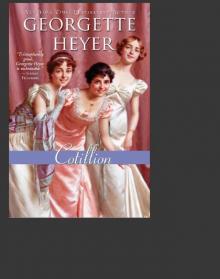 Cotillion
Cotillion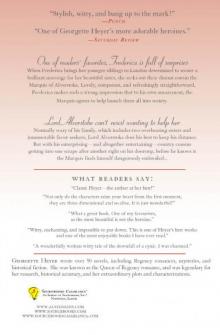 Frederica
Frederica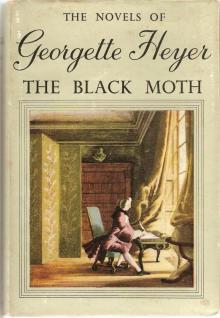 The Black Moth: A Romance of the XVIIIth Century
The Black Moth: A Romance of the XVIIIth Century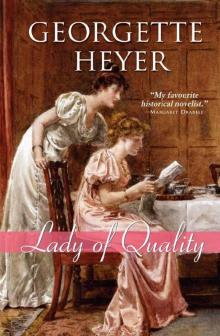 Lady of Quality
Lady of Quality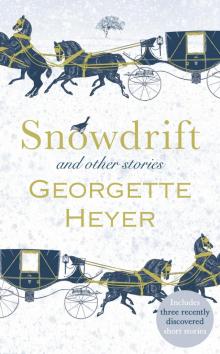 Snowdrift and Other Stories
Snowdrift and Other Stories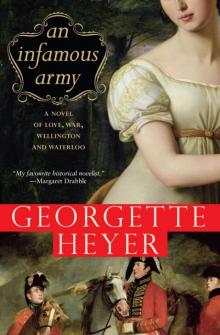 An Infamous Army
An Infamous Army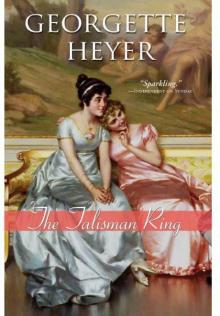 The Talisman Ring
The Talisman Ring Venetia
Venetia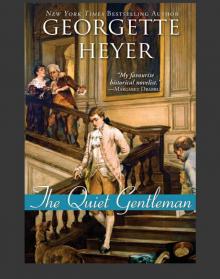 The Quiet Gentleman
The Quiet Gentleman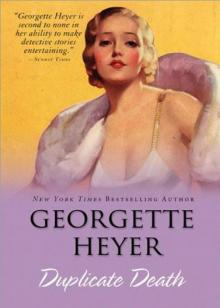 Duplicate Death
Duplicate Death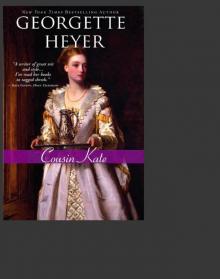 Cousin Kate
Cousin Kate Black Sheep
Black Sheep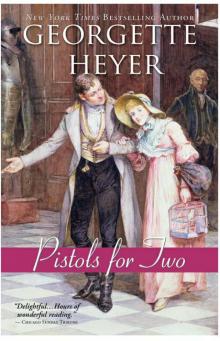 Pistols for Two
Pistols for Two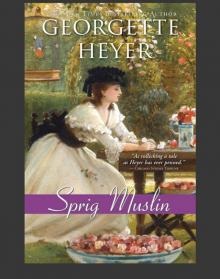 Sprig Muslin
Sprig Muslin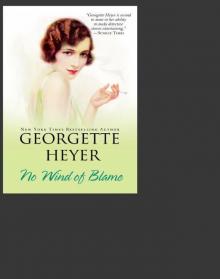 No Wind of Blame
No Wind of Blame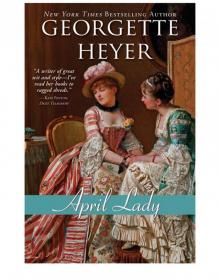 April Lady
April Lady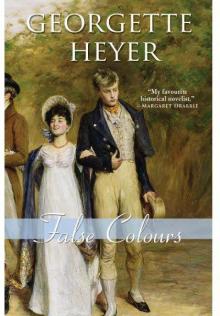 False Colours
False Colours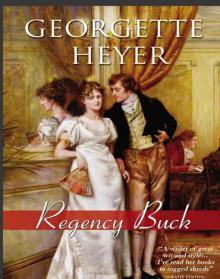 Regency Buck
Regency Buck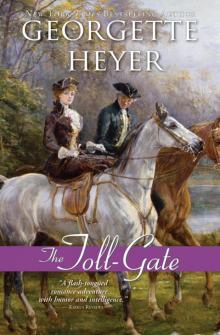 The Toll-Gate
The Toll-Gate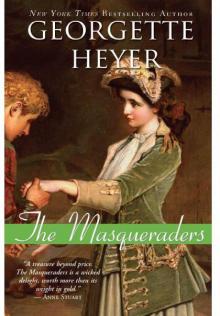 The Masqueraders
The Masqueraders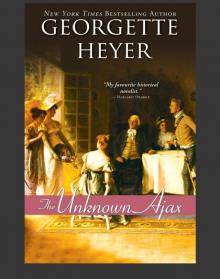 The Unknown Ajax
The Unknown Ajax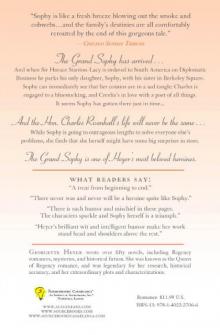 The Grand Sophy
The Grand Sophy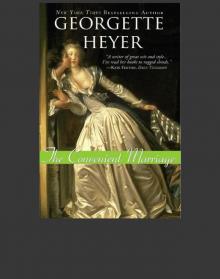 The Convenient Marriage
The Convenient Marriage Faro's Daughter
Faro's Daughter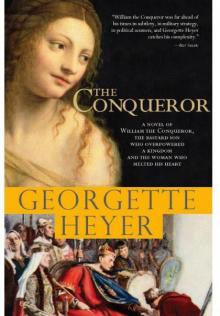 The Conqueror
The Conqueror The Foundling
The Foundling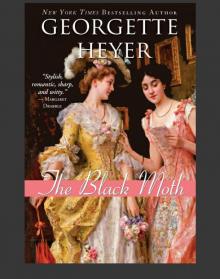 The Black Moth
The Black Moth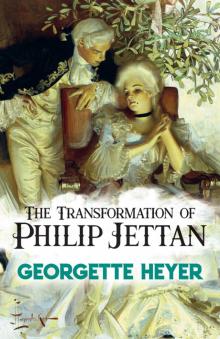 The Transformation of Philip Jettan
The Transformation of Philip Jettan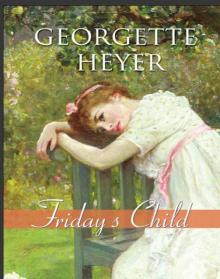 Friday's Child
Friday's Child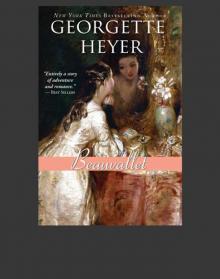 Beauvallet
Beauvallet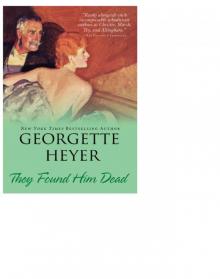 They Found Him Dead
They Found Him Dead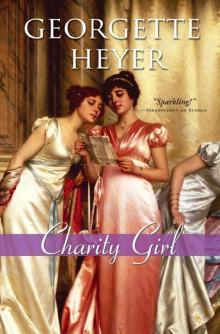 Charity Girl
Charity Girl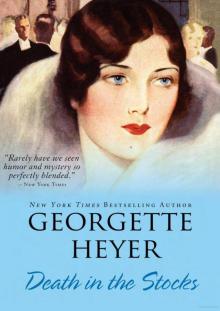 Death in the Stocks: Merely Murder
Death in the Stocks: Merely Murder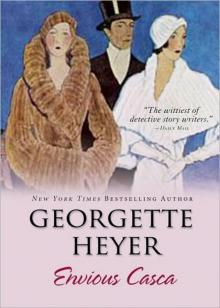 Envious Casca
Envious Casca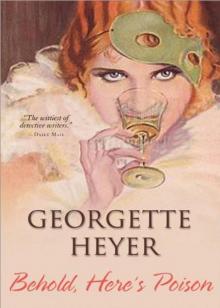 Behold, Here's Poison
Behold, Here's Poison Arabella
Arabella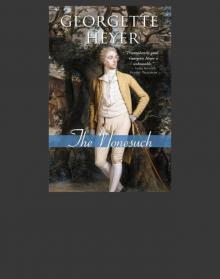 The Nonesuch
The Nonesuch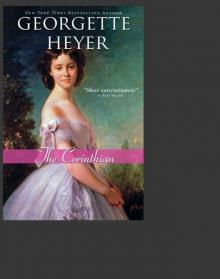 The Corinthian
The Corinthian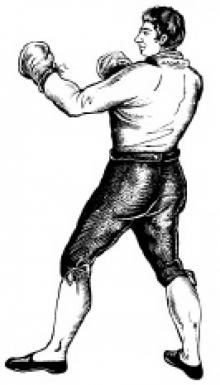 Jennifer Kloester
Jennifer Kloester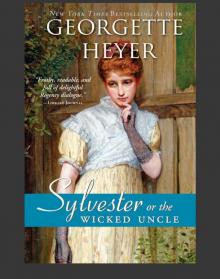 Sylvester
Sylvester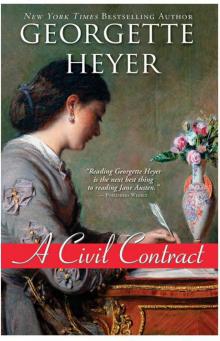 A Civil Contract
A Civil Contract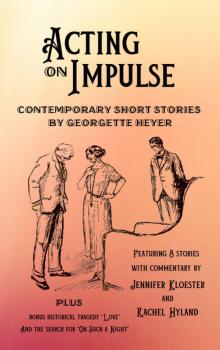 Acting on Impulse
Acting on Impulse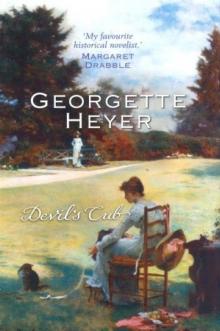 Devil’s Cub at-2
Devil’s Cub at-2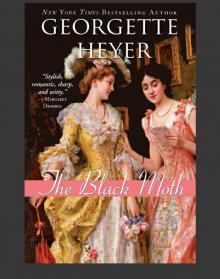 Black Moth
Black Moth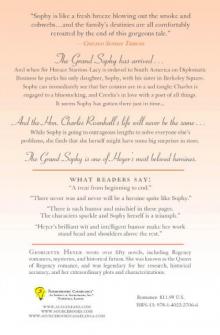 Grand Sophy
Grand Sophy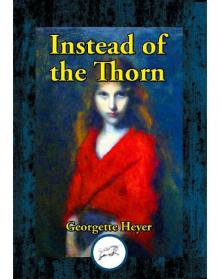 Instead of the Thorn
Instead of the Thorn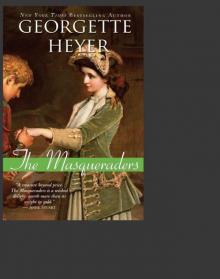 Masqueraders
Masqueraders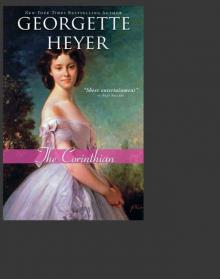 Corinthian
Corinthian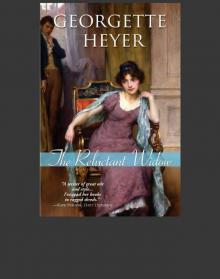 Reluctant Widow
Reluctant Widow